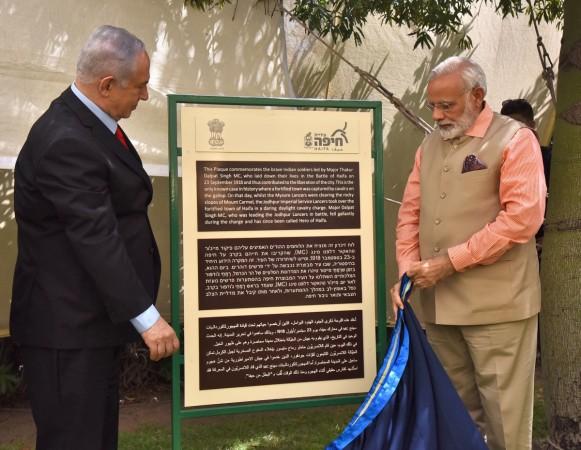
The thriving bromance between Prime Minister Narendra Modi and Israeli leader Benjamin Netanyahu is neither an accident nor a posturing aimed at boosting defence and economic ties. The rare, genuine bonhomie has legs, and deep ones at that.
Now, India-Israel ties are more than just about defence and trade relations. India is already the largest buyer of Israeli arms. New Delhi is already the second-largest trade partner of Israel in Asia, just behind Chinese mainland and Hong Kong combined.
Modi was the first Indian prime minister to visit Israel when he travelled there in July 2017. However, in a potent signal, Modi did not visit Ramallah, the seat of the remnants of a once vigorous Palestinian government. He did not meet Palestinian leaders either. That was true avant-garde.
And when Palestinian President Mahmoud Abbas visited India last year, Modi omitted from his speech the standard reference to East Jerusalem as the capital of a future state of Palestine.
As Rob Jenkins wrote in the Diplomat last year: "India is importing not just weapons from Israel, but a political mindset as well."
Is Modi, the prime minister of a country with the second-largest Muslim population in the world, risking too much and divesting precious political capital? Far from it.
India and Israel have travelled a full spectrum in their ties. To begin with, India was against the creation of Israel. Of course, there was no "India" per se at that point in history when Mahatma Gandhi took a stand against large-scale Israeli settlement in Palestine. He said the land belonged to the Arabs.
India did recognise Israel in 1950 but diplomatic relations with a "pariah nation" did not start for the next four decades. India did have minimal defence and commercial ties with Israel during this period but these were carefully conducted underground.
Vanishing pro-Palestine tokens
The establishment of diplomatic ties with Israel had to wait until a prime minister with alleged soft Hindutva credentials, PV Narasimha Rao, came to power. That's probably not mere coincidence.
Once, India was the only non-Arab country to recognise Palestine's statehood. In 2017 New Delhi did not categorically support Palestine's claim to East Jerusalem as its capital. India did, of course, vote against the US decision to move its embassy to Jerusalem, but it acted alongside a vast sweep of countries at the UN.
India of the idealistic 1970s and 80s was awash with pro-Palestine symbolism — thousands of Palestinian students studying in the country with scholarships, postage stamps with the flags of two countries, occasional high-profile mutinies on the international stage on behalf of Palestine, etc. For India of 2018 under Modi, that era is nothing but a laughable bygone.
Likewise, Indo-Palestine relations too have completed a full spectrum. All through the sunshine decades of an idealistic India, Palestine was a celebrated motif of anti-imperialism. A shining jewel in the crown of a non-aligned, secular, socialist India. Liberation campaigner Yasser Arafat was celebrated like a folk hero, like a bulwark against all things evil.
However, under Narendra Modi, India is seemingly taking stock of the returns of the political capital expended on Palestine. If political empathy and material assistance to a country are seen as some sort of a capital investment, then the returns do matter. Empathy and support are measured in terms of their mutuality, just as in the case of trade, strategic and defence relations.
Does this mutuality exist in the India-Palestine entente? What happened at the end of December might be just more than a straw in the wind. The Palestinian envoy to Pakistan deliberately engaged with known terror figure and mastermind of the Mumbai attack, Hafiz Saeed. Palestine expressed regret later and recalled the envoy, but this was not a casual error of judgment by an ambassador.
Similar worldview
Israel has reminded India over decades that Kashmir is India's Palestine and that its position is not significantly better than Israel's — surrounded by hostile forces. Historically, India never paid heed. However, what India saw in return was a momentum progressively building up within the Organisation of Islamic Countries (OIC) in favour of Pakistan. In recent times, the 57-nation bloc's support for Pakistan's take on Kashmir became unapologetic.
Modi and Netanyahu share the same worldview. Modi has manufactured an ethos wherein Netanyahu's Israel shines brightly as a suitable model. Modi's India is nationalistic, it hankers after military might and it doesn't shy away from bold confrontations. There is no trace any more of Nehruvian idealism that kindly harboured the flotsam and jetsam like Yasser Arafat. The political premise is informed by the notion of a strong (preferably monolithic) nation that survives, and thrives against all odds.
"I like soft power, but hard power is usually better. You need F-35s (fighter jets), cyber, a lot of intelligence... The weak does not survive, the strong survive, you make alliances with the strong, you are able to maintain peace by being strong..." Netanyahu said during the Raisina Dialogue in Delhi.
These words could as well have come out of Modi's mouth.











